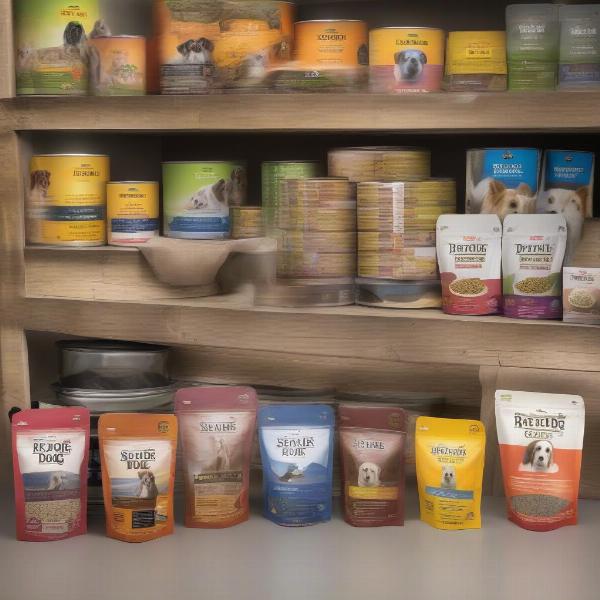Choosing the right food for your senior dog is crucial for their health and well-being. As dogs age, their nutritional needs change, and feeding them the best dog food for older dogs can help them maintain a healthy weight, strong immune system, and good cognitive function. This article will guide you through the process of selecting the perfect diet for your aging companion.
Understanding Your Senior Dog’s Nutritional Needs
As dogs enter their golden years, their metabolism slows down, and they become less active. This often leads to weight gain, which can exacerbate existing health problems like arthritis. Senior dogs also require higher levels of certain nutrients, such as glucosamine and chondroitin, to support joint health. Additionally, their digestive systems can become more sensitive, making it important to choose a food that is easy to digest.
Key Nutrients for Senior Dogs
- Protein: While senior dogs may not need as much protein as puppies, it remains essential for maintaining muscle mass and overall health. Look for high-quality, easily digestible protein sources like chicken, fish, or lamb.
- Fiber: Fiber helps regulate digestion and can prevent constipation, a common issue in older dogs.
- Glucosamine and Chondroitin: These compounds support joint health and can help alleviate the pain and stiffness associated with arthritis.
- Antioxidants: Antioxidants protect cells from damage and can help boost the immune system.
Choosing the Right Type of Food
 Variety of Senior Dog Food Options
Variety of Senior Dog Food Options
There are several types of dog food available for senior dogs, each with its own advantages and disadvantages.
- Dry Food (Kibble): Kibble is a convenient and affordable option. Look for formulas specifically designed for senior dogs with smaller kibble size for easier chewing.
- Wet Food: Wet food is often more palatable for senior dogs who may have dental issues or a decreased appetite. It also provides added hydration.
- Raw Food: Raw diets can be beneficial for some senior dogs, but it’s crucial to consult with a veterinarian to ensure the diet is nutritionally balanced and safe.
Reading Dog Food Labels
Understanding dog food labels is essential for making informed decisions about your senior dog’s diet. Look for the following:
- AAFCO Statement: The Association of American Feed Control Officials (AAFCO) statement confirms that the food meets minimum nutritional requirements for dogs.
- Ingredient List: Ingredients are listed in descending order by weight. Look for high-quality protein sources and avoid fillers like corn and wheat.
- Guaranteed Analysis: This section provides information about the minimum levels of protein, fat, fiber, and moisture in the food.
Best Wet Food for Older Dogs
If you are considering wet food for your senior dog, check out our article on the best wet food for older dogs for a detailed guide to choosing the perfect option. Wet food can be particularly beneficial for older dogs with dental issues or decreased appetite.
Transitioning to New Food
When switching your senior dog to a new food, do so gradually over several days to avoid digestive upset. Start by mixing a small amount of the new food with their current food and gradually increase the proportion of new food over time.
Conclusion
Choosing the best dog food for older dogs is a vital aspect of ensuring their continued health and happiness. By understanding their specific nutritional needs and carefully reading food labels, you can provide your senior companion with the optimal diet to support their golden years. Remember to consult with your veterinarian for personalized recommendations tailored to your dog’s individual needs.
FAQ
- When should I switch my dog to senior food? Most dogs can transition to senior food around age 7, but it’s best to consult with your veterinarian.
- My senior dog is losing weight. What should I do? Consult your veterinarian to rule out any underlying health issues and discuss dietary adjustments.
- Can I give my senior dog supplements? Yes, but always consult with your veterinarian before adding supplements to your dog’s diet.
- What are the signs of food allergies in senior dogs? Common signs include itching, skin irritation, vomiting, and diarrhea.
- How often should I feed my senior dog? Most senior dogs do well with two meals per day.
- Is it okay to give my senior dog treats? Yes, in moderation. Choose healthy treats specifically formulated for senior dogs.
- My senior dog has dental issues. What kind of food is best? Wet food or softened kibble is often easier for senior dogs with dental problems to eat.
For more information on caring for older dogs, check out our article on the best pet food for older dogs. We also have an interesting article about what to do if my dog ate a pad. You can find a wide selection of products at our long dog shop. For our Australian readers, we also have information about probiotics for dogs australia.
ILM Dog is a leading online resource for dog owners worldwide, offering expert advice on all aspects of dog care, from breed selection and health to training and nutrition. We are dedicated to providing practical, reliable information to help you give your furry friend the best possible care. Contact us at [email protected] or +44 20-3965-8624 for any questions.